Isopropyl Alcohol in Skincare

Introduction
Isopropyl Alcohol (IPA) is also known as isopropanol, 2-propanol, or basically known as “Rubbing Alcohol,”. It is a clear, volatile, flammable liquid, has a fermented smell, and is slightly bitter taste. In cosmetics, pharmaceutical products, and lotions, this compound plays a role as a solvent in topical formulations. Moreover, it has antimicrobial properties. This is why it is used in a range of products for nails, hair, and skincare products. It has various roles. It acts as an astringent agent, anti-foaming agent, and a solvent.
What is isopropyl alcohol?
Isopropyl Alcohol is a clear, colourless fluid that is often used as a solvent in skincare products. It kills bacteria and is of great use in anti-acne products. It also acts as the base for cosmetic products such as toners and aftershaves.
Additionally, in industrial settings, it serves as a degreaser and an astringent. The use of IPA for general disinfecting and cleaning results in very fast evaporation that leaves no residue behind. Although it dries the skin out, it's typically considered safe at low levels for topical use.
What does isopropyl alcohol do in skincare products?
The rubbing alcohol has so many uses, it includes -
- Kills bacteria - It helps kill bacteria on the skin, which can be beneficial for acne-prone skin.
- Acts as a solvent - By dissolving other components, it serves as a solvent, helping them to distribute fairly in the product.
- Tightens skin - Its astringent properties give the skin a matte finish and cause temporary tightening. Those with oily skin will find this interesting.
- Deeper penetration - It can allow other skincare products to reach deeper layers of the skin.
Isopropyl alcohol benefits in skincare
Here are some of the potential benefits of isopropyl alcohol:
- Oil control: This alcohol acts as an astringent. It tightens the pores on your skin and removes excessive oil from its surface. This will help to minimise shine and reduce pore visibility for individuals with oily complexions.
- Acne treatment: Isopropyl Alcohol can help kill acne-causing bacteria on the outer surface of the skin, making it an important ingredient in our Overnight Acne Spot Corrector. Nevertheless, it should be kept in mind that it could also end up drying out and irritating one's skin, thus not being suitable for everyone with acne.
- Product absorption: This ingredient makes some skincare compounds penetrate into the skin more deeply. Products with active ingredients like retinol or vitamin C can benefit from this.
Precautions while using isopropyl alcohol
Mentioned below are some of the measures you should take to avoid the side effects of IPA -
- Patch Test: Before using it on delicate skin, it is advised to do patch testing.
- Be careful with damaged skin: Use should be avoided on damaged skin or open wounds.
- Eye contact: Avoid products including isopropyl alcohol in your eyes. Should something like this occur inadvertently, rinse the area carefully with water.
- See a dermatologist: If you have already-existing skin conditions or concerns, discuss them with your dermatologist before including new skincare products in your regimen.
Conclusion
A good and suitable skincare routine is important in your life. Good health and self-esteem go together while caring for our skin and appearance. In our effort to achieve vibrant, healthy skin, we also become healthier, gain self-confidence, and promote our true skin.
Isopropyl alcohol might sound intense, but it's actually a handy ingredient. It helps products dry quickly on your skin and can even act as a gentle antiseptic. Just make sure it's balanced right in your routine to keep that glow going strong!
It is important to know ‘what is isopropyl alcohol’, how it works, and the correct dosage and concentration you need, depending on different concerns.


























































